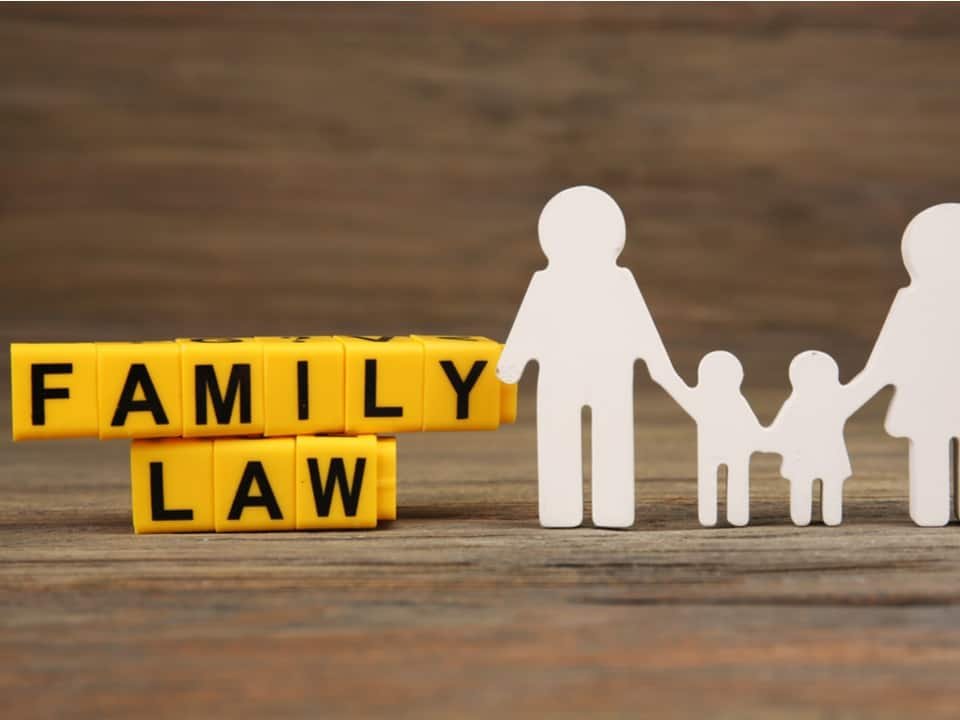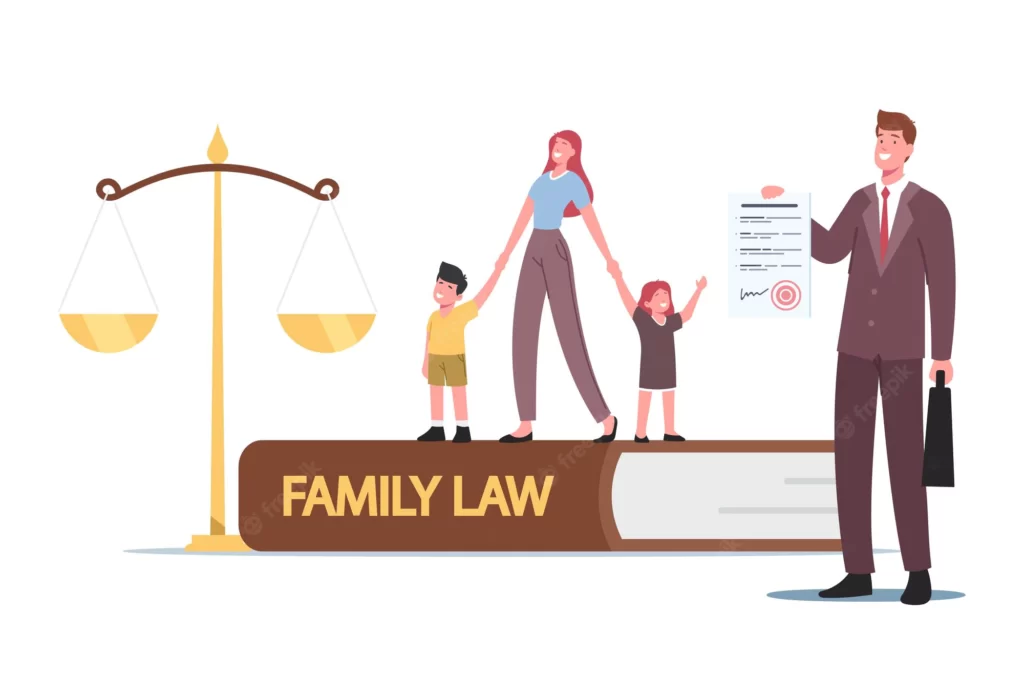Family Law has many aspects, and it can be a sensitive and complex area of law. When it comes to Family Law issues, you need an experienced lawyer who can offer you the support and advice you need. Family Law covers a wide range of topics, including divorce, child custody, adoption, and more. To handle any of these issues, you will need a lawyer who is knowledgeable about the law and who can guide you through the process.

A Family Law issue is a legal matter that relates to families in Pakistan. These include Marriages, Divorces, Child Custody, and Inheritances. These complex legal issues are handled by Family Lawyers in Pakistan.
Islamic law forms the basis of Pakistani Family Law. Legal issues related to families are handled by Family Lawyers in Pakistan. Inheritances, divorces, custody cases, and marriages can all be handled by them. Wills and trusts can also be drafted by Family Lawyers.
Lawyers who specialize in Family Law are called Family Lawyers. There are many things that can fall under this category, such as divorce, child custody, and adoption. Lawyers who specialize in Family Law can also help with issues such as domestic violence and spousal support. You should consult a Family Lawyer if you are dealing with any legal issue involving your family.
Various services can be provided by Family Lawyers in Pakistan. They can assist couples in resolving their differences and reaching an agreement on various issues concerning their marriage. Among these services are drafting prenuptial agreements and divorce settlements or negotiating child custody and visitation arrangements.
Victims of domestic violence can also seek assistance from Family Lawyers.
Their services include legal representation and advocacy, as well as emotional support. The victim may even be able to obtain a restraining order against the abuser with their help.
Family Lawyers in Pakistan assist both individuals and families. In difficult situations such as the death of a loved one, they can assist families in resolving conflicts between members. As well as estate planning, they can advise on succession planning.
The Law governing the legal rights and obligations of Muslim families is called Muslim Family Law. According to Islamic scholars, it is based on the Quran and the Hadith.
Marriage, Divorce, child custody, inheritance, and polygamy are among the issues covered in Muslim Family Law. The Muslim Family Laws Ordinance 1961 codifies Muslim Family Law in Pakistan.

Muslim Family Laws Ordinance 1961 governs the personal affairs of Muslims in Pakistan. Family Law based on Islamic principles is designed to protect the rights of Muslim families and individuals. There are several topics covered in the ordinance, including marriage, divorce, child custody, inheritance, and property rights. In addition, it specifies the procedures to be followed when spouses and other family members disagree.
Pakistani parliament enacted the ordinance in 1961, and it has been amended several times since then. Human rights activists have praised it as one of Pakistan’s most progressive pieces of legislation for protecting women’s rights. Some conservative Muslims, however, claim that the ordinance contradicts Islamic law.
According to the ordinance, marriage contracts must meet certain requirements, and marriages can be dissolved on certain grounds. As well as regulating child custody and maintenance, it also regulates inheritances.
Family Law in Pakistan is based on Islam since Pakistan is an Islamic Republic. Quran and Sunnah are the main sources of Pakistani Family Law. Family Law is also governed by the Constitution of Pakistan.
There are secular and sharia courts in Pakistan.
Family Law matters are handled by Sharia courts. Sharia courts come in different types, including the Council of Islamic Ideology, which advises the government on religious matters, and the Federal Shariat Court, which can overturn un-Islamic laws.
Families in Pakistan are governed by a variety of laws. Muslim Family Laws Ordinance, of 1961, the Dissolution of Muslim Marriages Act, of 1939, the Muslim Marriage Act, of 1965, and the Muslim Personal Law (Shariat) Application Act, of 1937 are among them.
Family Law Areas
As a branch of personal law, Family Law deals with legal issues related to families in Pakistan. Included in this are
Marriage in Pakistan is a legal contract between a man and a woman. Women must be 16 years of age to marry, and men must be 18 years of age. In the presence of witnesses, both the bride and groom sign a marriage contract, which is then registered with the local union council.
Pakistani law recognizes three types of marriage:
This type of marriage follows the customary rules laid down by the Hanafi school of thought. Sunni Muslim marriages require men to be 18 years old and women to be 16 years old. The bride’s guardian (wali) must consent to the marriage on her behalf. A wali can be her father, grandfather, brother, or any other male relative appointed by her father as her guardian. A divorced or widowed bride’s guardian must consent to her remarriage if she is divorced or widowed.
The Jafari school of thought governs this type of marriage and follows its customary rules. Shia Muslim marriages require men to be 18 years of age and women to be 16 years of age. A woman can appoint her own guardian in writing if she doesn’t have a male relative who can act as her guardian, unlike Sunni Muslims.
Christian Personal Laws govern Christian marriages in Pakistan

Divorce in Pakistan is governed by Family Law. Generally, divorce is governed by the Dissolution of Muslim Marriages Act of 1939. A Muslim husband can unilaterally divorce his wife by pronouncing talaq under this Act. As soon as talaq is pronounced, the marriage is dissolved, and the wife becomes haram (unlawful) for the husband. Divorce proceedings can also be initiated by the wife by proving that her husband has divorced her or failed to fulfill his marital obligations.
In Pakistani Family Law, divorce can be granted on a variety of grounds. Adultery, cruelty, desertion, non-maintenance of the wife, conversion to another religion, mental illness, and impotency are some of these. Additionally, khula permits women to obtain a divorce without their husband’s consent if they are willing to give up all their financial rights.
Both parties are free to remarry once the divorce decree is granted. Under Islamic law, however, divorced women must wait four months before remarrying their former spouses (known as iddah).
Khula is a divorce by which the wife forfeits all her financial rights under the marriage contract or customarily. The husband may also waive his right to unilaterally divorce his wife, granting her the same rights. In Pakistan, khula has been controversial, with many scholars and religious leaders arguing that it violates Islamic law. Although Khula has a significant precedent in Islamic jurisprudence, it is increasingly being used by women in Pakistan to obtain a divorce.
Khula dissolves marriages and gives the wife the right to remarry when they are granted. As a result, the husband will also lose any financial rights he had under the marriage contract or customarily. A husband may be required to pay alimony to his former wife in some cases. Those seeking to escape abusive or unhappy marriages can find Khula to be an empowering tool. Additionally, it can be used to negotiate favorable terms
In Pakistan, child custody decisions are always based on the best interests of the child. The doctrine of “normalcy” governs child custody decisions in this country. Generally, the mother is given primary custody of her child, but there are some situations in which the father may be given custody. When making a custody decision, the court will always consider what is in the child’s best interests.
When going through a divorce or separation, you will need to figure out child custody arrangements. During a divorce or separation, child custody can be one of the most difficult issues to resolve. If you want to make the best choice for your children and your family, you will have to consider what is best for them.
Physical custody and legal custody are the two types of child custody.
Physical custody refers to who lives with the child. When parents divorce, the child typically lives with one parent most of the time or all of the time. Visitation rights and regular parenting time are generally granted to the other parent.
With joint physical custody, both parents spend equal or nearly equal amounts of time with the child.
The legal custody of a child refers to who makes decisions about their welfare, such as their education and medical care. It is possible for a parent to have sole physical and legal custody, as well as joint physical and legal custody.
If you are going through a divorce or separation, it is important to speak with a lawyer about your options for child custody arrangements. You want to make sure that your children’s best interests are taken into account and that you make arrangements that will work for your family.

In Pakistan, there are many ways to adopt a child. The most common method is through Family Law. In civil law, Family Law deals with legal issues related to families. Among these are marriages, divorces, adoptions, child custody, and domestic violence.
The Family Law Ordinance 2001 governs adoption. Any Pakistani citizen can adopt a child under this ordinance. Adoptive parents must be at least 21 years old and not have biological children. Adoptive parents must also be Muslims.
Adoption in Pakistan begins with the consent of the birth parents. The guardian must consent if the birth parents are deceased or cannot be found. To adopt a child, a court application must be filed once consent has been obtained.
To determine whether the adoptive parents are suitable, the court will appoint a welfare officer. If the court grants permission for the adoption, the welfare officer will submit a report.
An Adoption Certificate will be issued if permission is granted. Obtaining a new birth certificate in the child’s name and registering the child in their new home require this certificate.
Family Law property disputes can be complex and emotionally charged. The assistance of a Family Lawyer can help you understand the process and ensure that your rights are protected.
When resolving a property dispute, the first step is to determine what property is to be divided. All assets acquired during the marriage as well as inherited or gifted property are included. The next step is to value the property based on this information. Appraisals, financial records, or other methods can be used to accomplish this.
Negotiating a settlement follows the determination of the property’s value. Mediation, negotiation, and arbitration can be used to resolve disputes. The trial will be held if a settlement cannot be reached. You can protect your interests by navigating these steps with the help of a Family Lawyer.

Domestic violence is an important issue in Family Law. A family or intimate relationship can be abused physically, sexually, emotionally, or financially. In Pakistan, domestic violence is all too common.
Domestic violence is dealt with by a number of laws in Pakistan. Domestic Violence Act 2010 is the most important of these. Victims of domestic violence are protected by this Act and have the right to file a lawsuit. Domestic violence perpetrators can also be punished under the law.
Our firm can help you with any Family Law issue you may have. We handle all types of cases under this area of law, including divorce, child custody, and alimony. It doesn’t matter what your situation is, we will work tirelessly to protect your rights and obtain the best outcome for you. Our experienced Family Law attorneys are available to meet with you today.
Our Family Lawyers have the experience and compassion to guide you through what can often be a difficult process. Since 1985, our CEO Mohsin Ali Shah has been practicing Family Law. Regardless of your unique situation, we will work with you to find the best solution.
Family Law issues, such as divorce, child custody, and visitation rights, can be handled by our firm. Our team also has experience handling domestic violence cases, so we can help you obtain the protection you need.
Contact one of our experienced attorneys if you are facing a Family Law issue today.